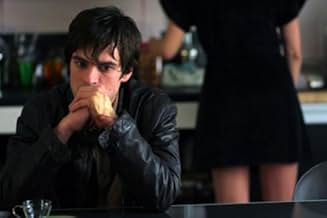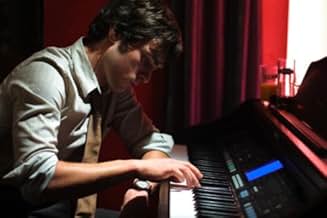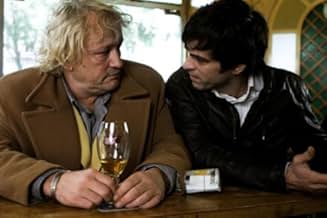Will Thomas condurrà ancora una vita di criminalità e crudeltà, proprio come suo padre criminale, o perseguirà il suo sogno di diventare un pianista?Will Thomas condurrà ancora una vita di criminalità e crudeltà, proprio come suo padre criminale, o perseguirà il suo sogno di diventare un pianista?Will Thomas condurrà ancora una vita di criminalità e crudeltà, proprio come suo padre criminale, o perseguirà il suo sogno di diventare un pianista?
- Regia
- Sceneggiatura
- Star
- Ha vinto 1 BAFTA Award
- 22 vittorie e 14 candidature totali
Recensioni in evidenza
Jacques Audiard, not the most famous but certainly one of the most talented french directors of the last ten years, has remarkably transcribed the mythology and some of the most eminent film-noir themes onto the modern era. The framing, lighting, music (especially its juxtaposition), mood and plot development are spot-on while the main performance my Romain Duris is career defining. The film stands out as one of the best modern neo-noir -a film with a rather singular style, akin to the director's equally commendable previous works.
As a character study of Thomas, the film somewhat succeeds in presenting his ambivalence as a petty criminal and as a frustrated pianist that is trying to regain his skill in playing the instrument. Thomas is, from all accounts, an ugly character that will engage in all kinds of under handed situations in order to make a living. Most of the motivation in Thomas' actions is driven by his loyalty to his small crook father, who is constantly nagging him to take care of the old man's criminal activities as well.
In Romain Duris, director Audiard gets a multi layered performance that is what keeps the film going. Mr. Duris, an intense actor, is the dominant figure in the movie, and perhaps the excuse for seeing the film. Nils Arestrup, as the father, has also some good moments.
Thomas (Romain Duris) is a very unsavory young man. His job is a sleazy one--he dispossesses squatters from apartments. In France, it is NOT easy to legally dispossess these folks--so Thomas and his thuggish friends beat the crap out of them or toss rats into the apartments to get the folks to leave. It seems that Thomas learned a lot from his ne'er do well father. However, hidden within is a part of his dead mother. The woman was a concert pianist and Thomas had this as his career goal as well. And, when Thomas happens to see his mother's old manager, the dream of being a respected pianist reignites within him. But just practicing the piano and improving his skills isn't enough- -he must decide if he wants to become respectable or remain a thug. Through much of the film, Thomas bounces back and forth between the two extremes. Where will Thomas eventually land?
The film is much better than the other films mentioned because Thomas' journey wasn't fast and his change wasn't complete and magical. In the other films, the problem was just too black and white and the changes unrealistic. Here, however, with a better script and a really nice performance by Duris, you've got a really compelling film. My only reservation is that this is NOT a film for everyone--it's very violent, sexual and not a neat picture that follow the expected formula. Well worth seeing regardless.
The plot is not so much of a linear story, but more of a cross-sectional cuts of various aspects of Thomas' life. On the more mundane side are his business activities that alway verge on being criminal, his affair with his partner's neglected wife and his relationship with his father to whom he seems quite devoted.
More interesting is his musical pursuits, triggered by a chance encounter with his late mother's manager who remembers his talent and invites him to an audition "when he is ready". This leads to his seeking help from an accomplished pianist Miao Lin, a young women who studied in the Beijing Conservatory, just arrived in Paris, speaking no French at all and "just a little" English. (Here we see the not unusual sloppiness when an Asian aspect is covered in a "western" movie. There is absolutely no logical reason for a woman from China to be speaking Vietnamese, except for one - the actress IS Vietnamese). Anyway, the communication purely through music and gesture is very well handled.
The shooting style is quite contemporary, and leans towards using darker scenes. Interesting to note that in the two series of piano practicing scenes, it's always dark and gloomy when he plays at home, but is reasonably bright when he is at coach Miao Lin's place.
As with such non-story-oriented movies, the ending is inconclusive. But that does not matter as it is the character study that is of prime interest.
Lo sapevi?
- QuizRomain Duris's sister is a pianist, and she is the one who taught him to play piano for this film.
- Citazioni
Sami: Playing piano is making you flip. Stop it now!
Thomas Seyr: Nothing's making me flip. I'm not flipping. I'm having a ball. I feel fantastic, dont' you see? It's important, I'm serious about it.
Sami: You gonna make dough from pianos?
Thomas Seyr: Not pianos, the piano! It's not about making money, it's about art.
Sami: What's in it for us? You coming to meetings all, 'Hi guys, I've been playing piano.' Shit, I'll take up the banjo.
Thomas Seyr: It's over your head
- ConnessioniRemake of Rapsodia per un killer (1978)
I più visti
- How long is The Beat That My Heart Skipped?Powered by Alexa
- It is said to be a remake of a movie with Harvey Keitel. What's the name of that movie?
Dettagli
- Data di uscita
- Paese di origine
- Siti ufficiali
- Lingue
- Celebre anche come
- The Beat That My Heart Skipped
- Luoghi delle riprese
- Aziende produttrici
- Vedi altri crediti dell’azienda su IMDbPro
Botteghino
- Budget
- 5.300.000 € (previsto)
- Lordo Stati Uniti e Canada
- 1.023.424 USD
- Fine settimana di apertura Stati Uniti e Canada
- 65.365 USD
- 3 lug 2005
- Lordo in tutto il mondo
- 11.757.109 USD
- Tempo di esecuzione1 ora 48 minuti
- Colore
- Mix di suoni
- Proporzioni
- 1.85 : 1
Contribuisci a questa pagina































